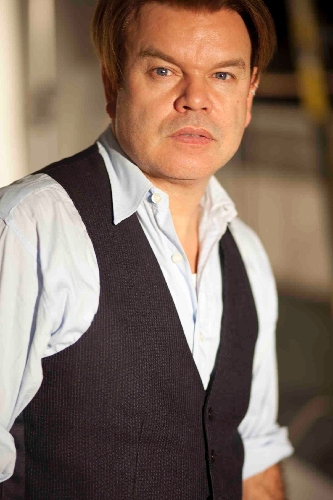Paul Oakenfold, DJing at Hard Rock, responsible for putting Vegas on clubbing map

Five years ago, Vegas nightclubs didn’t hire big-name DJs, and clubs were few. There was no XS, no Encore Beach Club, no Marquee. But then, Paul Oakenfold came on the scene and changed everything.
In 2008, Oakenfold lit the fuse of electronic music in Vegas by signing a deal with the Palms to DJ regularly at Rain nightclub.
At the time, I phoned Oakenfold – known as the most famous DJ in the world – for a front page column in the Review-Journal.
He told me he chose Vegas because it is a premier American city of young world travelers who craved electronic dance music more than most Americans at large.
He also understood Vegas was fortified with a strong base of locals who were into EDM, because he knew Vegas from various visits here.
“This is a good opportunity for the locals to put Vegas on the map in terms of clubbing,” Oakenfold said before he launched that Rain residency in 2008.
“I want the locals to be proud of this. I know how important they are. When I did my residency in Ibiza, certainly the locals were a big part of it.”
He not only put Vegas on the map, he made Vegas the center of the EDM map, as other DJs followed his steps, and hotels followed Rain’s path. The Strip is now consumed by clubs and dayclub pool parties.
Oakenfold has since left the Palms. On Saturday, he DJs at the Hard Rock pool.
Also Saturday, Oakenfold becomes the first musician to earn a second memorabilia case installed at the Hard Rock Hotel. That will happen at about
5:30 p.m. near Vanity nightclub.
It’s hard to overstate Oakenfold’s impact on electronic dance music. A one-time record label exec and pop music producer, he worked hard to launch house music in Ibiza in the late 1980s and 1990s, making Ibiza the dance music capital of the world.
In 2008, when he established his residency at the Palms, quite a few European DJs thought Oakenfold was crazy. Some have admitted this to me, only to later become resident DJs here, too.
So on the heels of Oakenfold, every major DJ has come to Vegas, transforming the Strip into the new EDM capital of the world, which also made it possible for the Electric Daisy Carnival to move from L.A. to Vegas last year.
If that’s not mind-blowing enough, in terms of Oakenfold’s influence, consider his 2002 album “Bunkka.” Long before Deadmau5’s breakthrough, “Bunkka” laid the groundwork for DJ-producer albums to flourish with original studio songs.
“Bunkka” was wall-to-wall melodic dance-pop, featuring vocalists Perry Farrell, Emiliana Torrini, Ice Cube, Tricky and even Hunter S. Thompson.
Some “Bunkka” music was used in the blockbuster movie “The Borne Identity” (alongside Moby’s “Extreme Ways”).
You still hear two “Bunkka” songs in pop culture – “Starry Eyed Surprise” and “Ready Steady Go,” which has played in fast-moving race car video games and “Tiger Woods” golf games, as well as Saab commercials.
But let’s get back to Oakenfold’s Vegas residency.
How did it really happen?
Last year, I got inside information from Pete Tong – that other legend of EDM who has made stars of fellow DJs by playing their music on Tong’s BBC Radio 1 show for two decades.
Tong said that “years and years ago,” he and Oakenfold were riding down the Strip, looked up and saw a Sheena Easton hotel marquee, and Oakenfold joked, “That will be us someday. That’s where we’ll all end up.”
But then, Oakenfold thought of Vegas seriously and set up shop here. Tong explains:
“Everyone in Europe – when that was announced, there was a bit of sniggering: ‘What is he doing now?’ But it was a real gateway. He was a pioneering DJ. Now everyone wants to do it.”
When I chatted with Oakenfold again last year, he revealed for the first time that other American cities were in play for his “Perfecto” residency.
“At the time, I got offered a residency in New York and L.A. I felt Vegas was the future. It wasn’t hard to see,” Oakenfold said. “It’s a 24-hour city. It’s a great city. A lot of people want to come and hang out and have fun.”
Vegas had political advantages over other American cities, too.
“In L.A., you’ve got the fire marshals trying to shut you down. In New York, the mayor doesn’t want any clubs going on.”
In other words, clubs in New York and L.A. are free-standing venues in neighborhoods, so they’re at the whim of noise complaints and politicos.
But in Vegas, clubs thrive in gigantic hotels immune to noise complaints and thus politicians.
“So I always felt – against a lot of people’s advice, I’ve got to be honest – I felt Vegas was the right move. A lot of people were saying, ‘It’s the wrong move.’ I didn’t see that.
“They just didn’t know Vegas. You’ve got a lot of hard-core fans among local fans. They’re the ones that deserve the pat on the back, really.”
Local fans and club workers do deserve a big pat on the back. But without Oakenfold, their Vegas EDM club explosion would never have happened.
Doug Elfman’s column appears Tuesdays, Thursdays and Fridays. Email him at delfman@reviewjournal.com. He blogs at reviewjournal.com/elfman.












